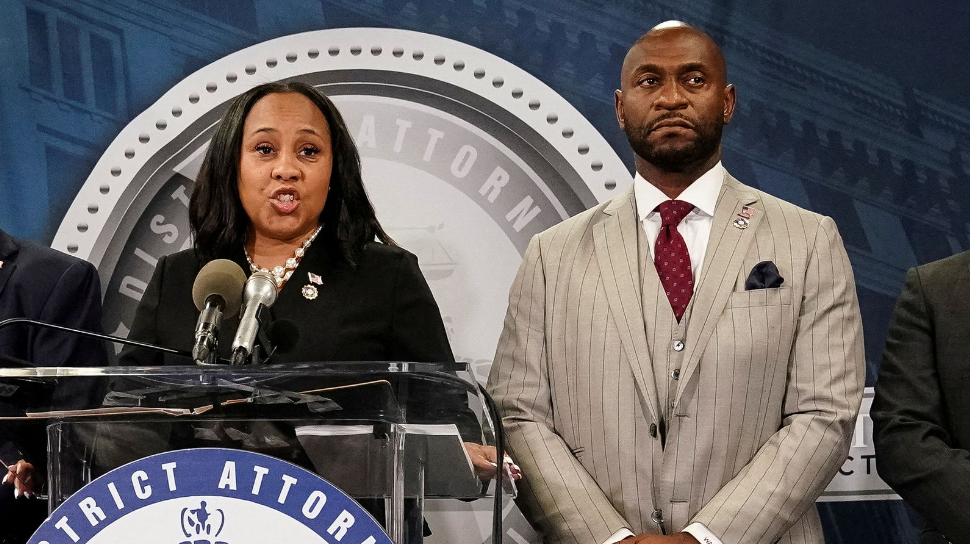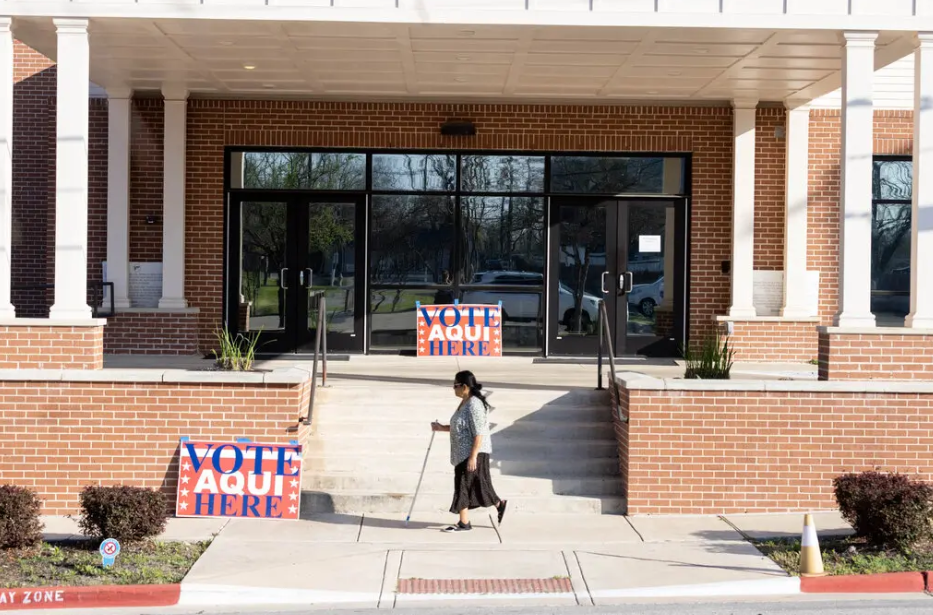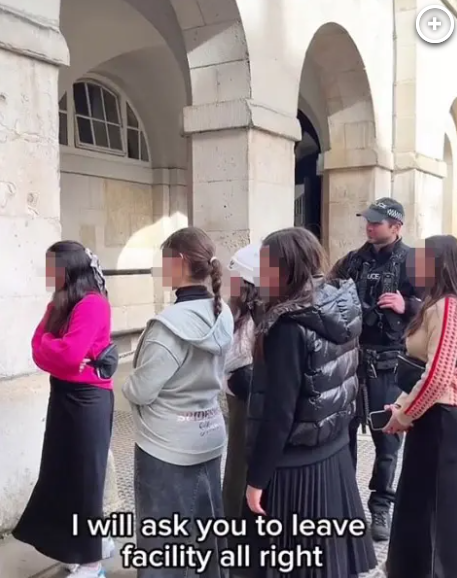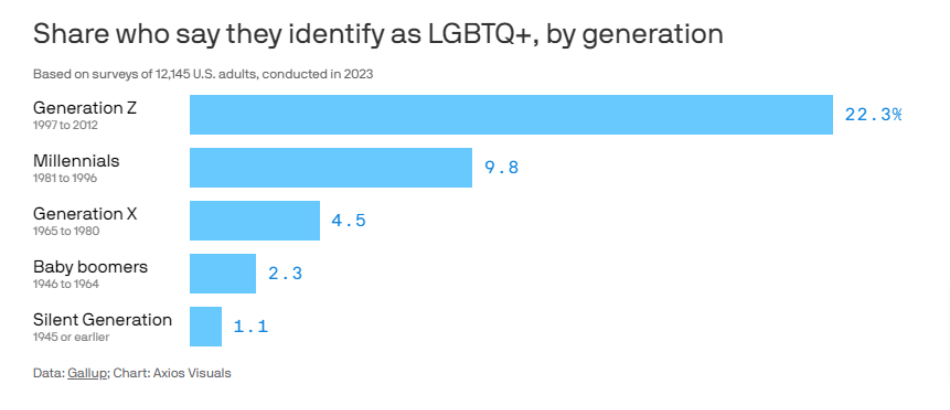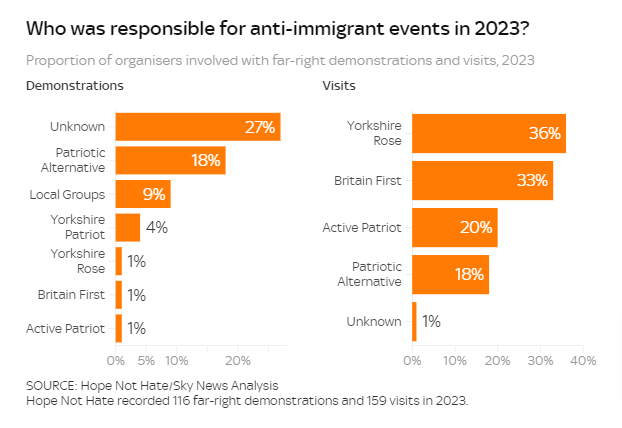-
Posts
10,763 -
Joined
-
Last visited
Content Type
Events
Forums
Downloads
Quizzes
Gallery
Blogs
Everything posted by Social Media
-
In a significant ruling, Fulton County Superior Court Judge Scott McAfee has decided that Fulton County District Attorney Fani Willis can proceed with prosecuting the racketeering case against former President Donald Trump and other co-defendants. However, there's a catch: Willis must either step down from the case herself or remove special prosecutor Nathan Wade, whom she appointed, due to an "appearance of impropriety" arising from their romantic relationship. Judge McAfee clarified that while there's no evidence of an actual conflict resulting from the relationship, the appearance of impropriety could compromise public perception of the case's integrity. He emphasized that Georgia law doesn't permit disqualification based solely on poor judgment or unprofessional conduct, but the decision aims to maintain public trust in the legal process. Despite this finding, the judge acknowledged concerns about the ongoing perception of impropriety as long as Wade remains involved in the case. This ruling offers a partial victory for Willis, enabling the case to continue, albeit with adjustments to address the perceived conflict of interest. The legal dispute stemmed from a motion filed by one of Trump's co-defendants, Michael Roman, who alleged misconduct by Willis due to her relationship with Wade. Roman claimed that Willis benefited financially from Wade's appointment and sought disqualification of the DA and dismissal of the case. During arguments, Willis and Wade confirmed their relationship but asserted it began after Wade's appointment. They denied any financial benefit to Willis from Wade's work. Nevertheless, an evidentiary hearing was conducted to examine these allegations further. The hearing featured testimony from Willis, Wade, and witnesses presented by Roman's legal team. While efforts were made to challenge the timeline of Willis and Wade's relationship, McAfee ultimately ruled that evidence of an actual conflict was lacking. The case, which accuses Trump and others of conspiring to overturn election results in Georgia, has attracted significant attention. The judge's decision ensures its continuity, albeit with measures to address concerns about impartiality and public perception. As the legal proceedings unfold, the case continues to be closely watched, reflecting the broader political and legal ramifications of the allegations against Trump and his co-defendants. 16.03.24 Source
-
NHS England has made the decision to cease the routine prescription of puberty blockers for children at gender identity clinics, citing insufficient evidence regarding their safety and effectiveness. Instead, these blockers will now only be available as part of research initiatives. The move follows a review conducted by Dr. Hilary Cass, which highlighted gaps in evidence surrounding the drugs and called for a transformation in the model of care for children experiencing gender-related distress. This decision comes ahead of the publication of an independent review into gender identity services in England. Puberty blockers, also known as puberty suppressing hormones, temporarily halt the physical changes associated with puberty. They are often prescribed to children questioning their gender identity to pause developments such as breast growth or facial hair. The sharp increase in referrals to the Gender Identity Development Service (GIDS) has prompted scrutiny, with the service experiencing a surge from 250 referrals per year to over 5,000 in 2022. Currently, fewer than 100 young people in England are prescribed puberty blockers by the NHS. NHS England had previously introduced an interim policy restricting the prescription of puberty blockers to research trials or "exceptional circumstances." The new policy confirms that routine prescribing outside of research trials will cease, although individual clinicians can still apply for funding for patients on a case-by-case basis. GIDS is scheduled to close at the end of March, with new NHS services set to open in London and Liverpool in April, followed by regional specialist centers over the next two years. Health Minister Maria Caulfield emphasized the decision's focus on evidence-based care and safeguarding children's well-being. The consultation on gender services received over 4,000 responses, reflecting diverse perspectives on the issue. John Stewart, national director of specialized commissioning at NHS England, acknowledged the polarized nature of the debate surrounding puberty blockers. While some argue for continued access through research, others disagree fundamentally with their routine availability. NHS England intends to initiate a study into the use of puberty blockers by December 2024, with details on participant eligibility yet to be finalized. 16.03.24 Source
-
- 1
-

-
The growing support for former President Donald J. Trump among Latino voters is reshaping the political landscape and posing challenges for Democrats who have relied on Latino support in recent elections. Polls indicate that Trump's standing among Latino voters has increased since his defeat in 2020, with some surveys showing him winning over 40 percent of Latino voters, a level not seen for a Republican in two decades. This surge in support has Democrats scrambling to maintain their majority among Latino voters, whose influence is crucial in several key battleground states. The shifting dynamics among Latino voters reflect the broader reality of the 2024 election, where neither party can rely solely on white voters to secure victory. With Latinos comprising an estimated 15 percent of eligible voters this year, their significance in determining electoral outcomes cannot be overstated. Races in states like California, Arizona, and Nevada, where Latinos make up a significant portion of the electorate, are poised to play a decisive role in shaping the political landscape. The reasons behind the shift in Latino voter preferences are multifaceted and complex. Trump's appeal to certain segments of the Latino community, including those working in law enforcement along the Mexican border, Cuban Americans in Florida, and evangelical Christians, has contributed to his growing support. Additionally, second- and third-generation U.S.-born Latinos are increasingly aligning with the Republican Party, particularly those without college degrees. The education divide among Latino voters mirrors broader trends in the electorate, with Trump performing better among those without college degrees compared to college-educated Hispanics. This trend underscores the diverse nature of the Latino population and the complexities of political identification within the community. While Republicans have made significant inroads among Latino voters, it remains uncertain whether these changes will be major or lasting. Some Democratic strategists believe that current polls may overestimate Hispanic support for Trump and anticipate a shift back towards the Democratic Party in the coming months. Nevertheless, both parties are intensifying their outreach efforts to Latino voters, recognizing the pivotal role they play in determining electoral outcomes. Republicans have increased outreach efforts, particularly in key states like Florida, Texas, and New Mexico, while Democrats are focusing on retaining support among key demographics within the Latino community. Ultimately, the evolving dynamics among Latino voters underscore the importance of a nuanced understanding of this diverse electorate and the need for both parties to engage effectively with Latino communities to secure electoral success. 16.03.24 Source
- 1 reply
-
- 1
-

-
The incident involving a group of US tourists heckling a King’s Guard outside Buckingham Palace has sparked outrage and condemnation after a UK cop stepped in to reprimand them for their disrespectful behavior. In a now-viral video shared on social media, the tourists can be seen shouting out incorrect names and generally harassing the guard as they attempt to elicit a response. The situation escalated when a police officer intervened, chastising the tourists for their actions and reminding them of the seriousness of the guard's duties. “These soldiers serve their country. They take their job seriously,” the cop firmly stated. “They are responsible for protecting this facility, they are not an object of ridicule.” The officer emphasized that while the tourists may have been having fun, the guard was not, and their behavior was unwelcome and disrespectful. He pointed out the long hours and exhausting nature of the guard's duty, urging the tourists to show respect and leave the premises. The role of a King’s Guard is one of solemn duty, focused on protecting the royal residence and remaining vigilant for any potential threats. Guards are not permitted to directly interact with tourists, and their role is not to entertain or engage with visitors. The cop's intervention was praised by viewers of the video, with many commending his swift response to the mistreatment of the guard. Comments hailed the officer for his patience and reasonableness, contrasting his demeanor with that of law enforcement in other countries. However, the incident also drew criticism from American viewers, who expressed embarrassment and regret over the behavior of their fellow countrymen. Some apologized on behalf of the tourists, acknowledging the lack of respect displayed towards the guard and his duty. The incident serves as a reminder of the importance of treating others with respect and consideration, particularly those who serve in roles of duty and responsibility. It also highlights the need for tourists to be mindful of cultural differences and to conduct themselves appropriately when visiting foreign countries. While the tourists in question may have viewed the guard as a character to be laughed at or interacted with, the reality is that he is a dedicated serviceman performing a vital duty. The incident serves as a cautionary tale about the consequences of disrespectful behavior and the importance of showing appreciation for those who serve their country. 16.03.24 Source
-
The House Republican leadership is urging GOP members to refrain from campaigning against each other as internal divisions threaten the party's slim majority in the chamber. Speaker Mike Johnson and House Majority Leader Steve Scalise addressed concerns about the impact of intra-party conflict on the upcoming November elections, warning that such infighting could make it easier for Democrats to seize control of the House. Despite these warnings, some firebrand conservatives, including Rep. Matt Gaetz and key members of the House Freedom Caucus, are actively campaigning against fellow Republican incumbents who are facing primary challenges. This behavior has sparked tensions within the party and prompted House GOP leaders to emphasize the importance of unity and solidarity ahead of the elections. The House GOP's campaign arm, the National Republican Congressional Committee (NRCC), typically refrains from intervening in primaries but emphasizes support for incumbent members. NRCC Chair Richard Hudson reiterated this stance, emphasizing the need to focus on defeating Democrats in the general election. On the other side, those supporting primary challenges to GOP incumbents defend their actions, arguing that they are standing up for their principles and representing their constituents' interests. The internal discord within the House GOP comes at a critical time, as the party seeks to maintain its majority in the face of growing Democratic momentum. Despite the challenges, senior GOP lawmakers point out that Democrats also face their own internal divisions and primary battles, suggesting that both parties are grappling with internal fractures as they prepare for the upcoming elections. 16.03.24 Source
- 1 reply
-
- 1
-

-
In a concerning revelation, a parliamentary watchdog has found that doctors issued "do not resuscitate" (DNAR) orders for elderly and disabled patients during the COVID-19 pandemic without the knowledge or consent of their families. This breach of human rights, outlined in a new report by the Parliamentary Health Service Ombudsman (PHSO) in collaboration with the charity Dignity in Dying, sheds light on significant failings in end-of-life care conversations, particularly regarding vulnerable populations. The report highlights at least 13 cases where patients and their families were not informed about the issuance of DNAR orders, infringing upon their fundamental rights. It calls attention to the unacceptable nature of these failures and emphasizes the need for improvement in how healthcare professionals approach discussions about death and end-of-life care, especially with elderly and disabled patients. During the pandemic, concerns arose over the inappropriate application of DNAR orders, particularly affecting elderly individuals and patients with learning disabilities. The NHS's annual Learning Disability Deaths Review for 2021 revealed that DNAR orders were not correctly followed in 60 percent of deaths in 2020, with "learning disability" cited as a reason for withholding resuscitation in some cases. One poignant example highlighted in the report is the case of Sonia Deleon, a 58-year-old woman with schizophrenia and learning disabilities who was wrongly issued a DNAR order during her hospitalization for COVID-19. Despite her family's unawareness, multiple DNAR notices were placed in Sonia's file, listing reasons such as frailty, learning disabilities, schizophrenia, and dependency for daily activities. Sonia's sister, Sally-Rose Cyrille, expressed devastation and anger upon discovering this information, emphasizing the profound impact on their family. Key findings from the PHSO and Dignity in Dying underscore the urgent need for improvement in end-of-life care conversations. These include the observation that discussions about resuscitation often occur too late, particularly in emergency situations, and that healthcare professionals fail to provide accessible information to patients and their families. There is also a lack of public awareness about cardiopulmonary resuscitation (CPR) and decision-making responsibilities. Health Ombudsman Rob Behrens stressed the importance of normalizing conversations about end-of-life care and ensuring that individuals are treated with respect and dignity regardless of age or disability. He emphasized that failing to engage in these discussions constitutes maladministration and a breach of human rights, calling for urgent improvements within the NHS. Usha Grieve, Director of Partnerships and Services at Compassion in Dying, echoed Behrens' sentiments, emphasizing the harm caused by poor communication and the erosion of trust between patients and healthcare professionals. She stressed the need for systemic change to address longstanding communication failures and ensure that individuals receive compassionate and dignified care. 15.03.24 Source
-
The ongoing violence and instability in Haiti have been fueled by a steady influx of guns and weapons smuggled from the United States, according to experts. Despite Haiti's lack of firearms manufacturing capabilities, its streets have become battlegrounds adorned with high-powered rifles, shotguns, and automatic weapons, largely originating from states with lenient gun laws such as Florida, Arizona, and Georgia. This clandestine trade has provided Haiti's gangs with an extensive arsenal, significantly outmatching the country's law enforcement agencies. With an estimated 500,000 small arms in circulation, only a fraction of them legally registered, the situation has escalated due to an increase in trafficking operations in recent years. Robert Muggah, a security expert from the Igarapé Institute, highlights the role of straw purchasers in obtaining firearms from the US, particularly in states with weak regulations. These weapons, ranging from handguns to military-grade rifles, empower criminal gangs and contribute to a surge in violent crimes, including sexual violence, kidnapping, and displacement. Recent seizures have exposed the ease with which traffickers operate, acquiring weapons through various means and smuggling them into Haiti. US authorities have made efforts to curb this trafficking, but challenges persist due to the sheer volume of goods crossing borders and the lack of resources for screening shipments. The Haitian government's customs and border forces are under-resourced, further exacerbating the problem. With limited personnel and inadequate equipment, monitoring the country's extensive coastline and land borders is a daunting task. As a result, illegal arms trafficking routes have proliferated, including shipments from Florida and smuggling routes over the Dominican Republic border. Additionally, clandestine airstrips scattered throughout Haiti provide alternative means for smuggling weapons, with some airstrips barely monitored. Private aircraft registered in the US further complicate tracking efforts, as they are not required to file official flight plans when flying below 18,000 feet. As long as there is a demand for firearms and ammunition, trafficking from the US to countries like Haiti will persist, driven by both the availability of weapons in the US and the demand from criminal groups in the Caribbean region. Addressing this issue requires coordinated efforts to strengthen enforcement, enhance border security, and disrupt illicit trafficking networks. Without effective measures, the cycle of violence fueled by the illegal arms trade is likely to continue unabated. 15.03.24 Source
-
J.K. Rowling is once again under fire for her controversial remarks, this time for insinuating that Nazis did not burn books on trans healthcare and research. The Harry Potter author took to Twitter to express disbelief at the claim, prompting swift backlash from users who pointed out the historical accuracy of the event. Rowling's tweet, which questioned the validity of the claim, drew attention to the documented actions of Nazi-supporting youth who targeted the Institute of Sexology in 1933. This institution, renowned for its progressive work on transsexual understanding and advocacy for LGBTQ+ rights, fell victim to Nazi persecution as its library contents were looted and burned in the streets. Critics accused Rowling of engaging in Holocaust denial, highlighting the well-documented history of Nazi oppression against marginalized communities, including Jewish people, homosexuals, and transgender individuals. Despite evidence to the contrary, Rowling doubled down on her stance, prompting further condemnation from users who pointed out the flaws in her argument. One user, Alejandra Caraballo, confronted Rowling on X for her misleading statements, prompting a dismissive response from the author. Rowling's attempt to deflect criticism by shifting the focus to a different argument only exacerbated the situation, drawing comparisons to the practice of moving goalposts. This incident is not the first time Rowling has come under scrutiny for her anti-trans rhetoric. Despite claiming she never intended to offend anyone, her continued remarks have sparked controversy and drawn criticism from LGBTQ+ advocates and allies. The latest controversy surrounding Rowling's remarks underscores the ongoing debate over LGBTQ+ rights and the importance of accurate historical representation. As Rowling continues to face backlash, it remains to be seen how she will address the criticism and whether she will reconsider her stance on trans issues. 15.03.24 Source
-
The European Union is making significant strides towards utilizing €27 billion in profit generated by frozen Russian assets to support Ukraine's war effort. Officials from the European Commission are preparing a proposal that they deem legally sound for consideration by member states, potentially before a meeting of prime ministers scheduled for next week in Brussels. These frozen assets, totaling around $300 billion belonging to the Russian central bank, are primarily held in the west, with approximately 70% stored in the Belgian central securities depository Euroclear, amounting to €190 billion. It is estimated that these assets could generate between €15 billion and €20 billion in after-tax profits by 2027, with an expected €2 billion to €3 billion in profits this year alone, depending on global interest rate fluctuations. While there is optimism regarding an agreement to seize these profits, consensus on how the funds should be utilized remains elusive. Some member states are hesitant to allocate the funds for military purposes, preferring instead that they be directed towards reconstruction and humanitarian aid efforts in Ukraine. Ireland, constrained by its constitutional neutrality, contributes funds to Ukraine under the condition that they are used for non-lethal purposes such as demining. The European Commission is not currently presenting options for the use of the funds, intending to leave this matter open for further discussion among member states. However, there is momentum building behind the decision to allocate the profits to Ukraine, particularly for military support. The agreement reached by EU leaders last month suggests that the proceeds could be held in a separate account, marking progress towards the decision to confiscate and allocate the funds to Ukraine. It is anticipated that a portion of the funds will be retained within the EU to serve as a defense fund against potential legal retaliation from Russia in the future. The move to confiscate Russian assets and allocate them to Ukraine is likely to pressure the British government to take similar action. With the Russian central bank holding £26 billion in the UK, there are calls for these assets to be seized and transferred to Kyiv. However, financial institutions in the UK are resisting this move, fearing potential repercussions for the City of London's reputation. Overall, the proposal to utilize frozen Russian assets to support Ukraine represents a significant step forward in addressing the ongoing conflict and providing much-needed assistance to the Ukrainian people. 15.03.24 Source
-
The decision to grant Donald Trump access to classified intelligence briefings, a customary practice extended to major-party candidates, should be reevaluated this year. Given Trump's record and behavior, he poses a significant national-security risk, and allowing him access to sensitive information could have dire consequences. Trump's presidency revealed that he is fundamentally unbriefable—he disregards information and lacks comprehension of complex national-security matters. More alarmingly, Trump's conduct during his presidency raised serious concerns about his trustworthiness and suitability to handle classified information. As someone with experience holding security clearances, I can attest that individuals with access to classified material are expected to adhere to strict guidelines and behaviors. Trump's actions, however, raise numerous red flags that would typically prompt investigation or revocation of clearances for federal employees. Trump's hostility towards the U.S. government, his erratic behavior, unreported foreign contacts or financial dealings, opaque finances, and admiration for authoritarian leaders like Vladimir Putin and Kim Jong Un all constitute serious concerns for national security. Moreover, Trump's mounting financial debts and emotional instability further exacerbate these concerns. Allowing Trump access to classified briefings poses a significant risk, as he could potentially disclose sensitive information or use it for personal gain. His past actions, including attempts to overturn a legal election and support for violent insurrectionists, underscore the severity of the situation. While the decision ultimately rests with the sitting president, denying Trump access to classified material would be a prudent measure to safeguard national security interests. President Biden can delay Trump's access for as long as possible, minimizing the potential damage until the American people decide on the matter through the electoral process. 15.03.24 Source
-
A federal judge is set to hear arguments on Thursday regarding the prosecution of Donald Trump for possession of classified documents, with his legal team contending that the former president had the right to retain these records when he departed the White House for Florida. The crux of the matter revolves around differing interpretations of the Presidential Records Act. Trump's attorneys assert that this legislation granted him the authority to classify the documents as personal and keep them in his possession after his presidency concluded. However, special counsel Jack Smith's team contends that the files Trump is accused of possessing are presidential records, not personal ones, and that the statute does not apply to classified and top-secret documents housed at his Mar-a-Lago estate in Florida. Prosecutors argue that the Presidential Records Act does not exempt Trump from criminal liability, nor does it allow him to unilaterally designate highly classified presidential records as personal. They maintain that Trump's actions may constitute obstruction of justice and warrant criminal investigation. The outcome of this legal dispute will determine whether the case proceeds to trial or is dismissed. U.S. District Judge Aileen Cannon, nominated to the bench by Trump himself, will preside over the hearing and consider the arguments put forth by both sides. In addition to the dispute over the Presidential Records Act, the judge will also hear arguments on a separate motion filed by Trump's legal team, asserting that the statute forming the basis of the criminal charges against him is unconstitutionally vague as it pertains to a former president. Trump's defense has consistently invoked the Presidential Records Act since the FBI's search of Mar-a-Lago in August 2022. Trump's lawyers argue that he designated the records he retained as personal property, while prosecutors contend that these documents included highly sensitive information related to national security. Judge Cannon, while previously ruling in favor of the special counsel's team on procedural matters, has hinted at the unique nature of prosecuting a former president for possession of classified documents. The case marks the first-ever criminal prosecution of a former U.S. president without charges related to the transmission or delivery of national defense information. Trump faces 40 felony counts in Florida, alleging that he willfully retained classified documents and resisted government demands to return them after leaving office. Prosecutors emphasize the severity of the charges and the alleged misconduct, including Trump's alleged efforts to conceal records and obstruct the FBI investigation. The hearing represents the latest development in one of four prosecutions Trump faces as he endeavors to return to the White House. Both sides have proposed trial dates in the summertime, pending the judge's ruling. 15.03.24 Source
-
Texas is facing a daunting climate and development dilemma as it progresses further into the 21st century, according to Jay Banner, a geologist at the University of Texas at Austin. Speaking at South By Southwest, Austin's renowned technology and culture event, Banner highlighted the unique challenges Texas confronts due to its size and geography. Banner emphasized that Texas experiences a combination of climate challenges more intensely than any other place. He pointed out that approximately 40 percent of homes in the United States are at extreme risk from climate change, including heat, wind, and air quality issues. This poses a significant threat to American home values, with nearly $20 trillion potentially at risk, particularly in cities with high property values. However, Texas faces additional challenges related to water and heat. With the state's population projected to nearly double by 2070, there will be a substantial increase in water demand from both residents and industries. At the same time, rising temperatures, fueled by fossil fuel emissions, are leading to more frequent and intense heatwaves, exacerbating drought conditions and reducing water availability. This presents a paradoxical situation where a growing population demands more water, while climate change reduces its availability. Banner described a future where outdoor workers face increasingly harsh conditions due to rising temperatures, while indoor workers may find themselves isolated in climate-controlled environments, disconnected from nature. To address these challenges, Banner suggested several adaptation strategies. He emphasized the importance of investing in renewable energy and reducing impervious surfaces to mitigate heat buildup in urban areas. Additionally, he advocated for rainwater harvesting and greywater reuse to alleviate water shortages, particularly in arid regions like Texas. While implementing these measures may require significant investment and infrastructure upgrades, Banner emphasized the need for collective action and optimism about the future. He stressed that individual solutions alone are insufficient to address the scale of the challenges posed by climate change and population growth in Texas. As Texas grapples with its climate and development paradox, Banner's message underscores the importance of proactive measures and collaborative efforts to build a more resilient and sustainable future for the state. 15.03.24 Source
-
A recent Gallup survey released on Wednesday reveals a significant milestone: almost a quarter of Generation Z adults in the United States now identify as lesbian, gay, bisexual, transgender, or another sexual orientation besides heterosexual. This marks a new record for LGBTQ+ identification among adults, showcasing a notable shift in societal attitudes and self-identification over the past decade. The survey underscores the growing diversity within the LGBTQ+ community, with women emerging as nearly twice as likely as men to identify as LGBTQ+. Among women, bisexuality emerges as the most common form of LGBTQ+ identification, whereas gay and bisexual identifications prevail among men. However, the most striking finding pertains to Generation Z, born between 1997 and 2012, who exhibit a significantly higher likelihood of identifying as LGBTQ+ compared to other generations. Notably, almost three in 10 Gen Z women identify as LGBTQ+, contrasting with 12.4% of millennial women and 4.7% of Generation X women. Similarly, over one in 10 Gen Z men identify as LGBTQ+, roughly double the percentage among millennial men. The statistics paint a clear picture: 22.3% of Generation Z individuals identify as something other than heterosexual, reflecting a notable increase from previous surveys. Bisexuality emerges as the predominant identification among nearly two-thirds of LGBTQ+ Gen Z adults. The broader societal context suggests that alongside the growth of the LGBTQ+ community, there exists both heightened acceptance and increased institutional bias. While societal attitudes toward non-heterosexual orientations have evolved positively, legislative efforts in some states have sought to restrict LGBTQ+ rights, particularly targeting transgender individuals. This survey underscores the ongoing struggle for equality and acceptance faced by the LGBTQ+ community, highlighting the need for continued advocacy and support to combat discrimination and promote inclusivity for all individuals, regardless of sexual orientation or gender identity. 15.03.24 Source
-
In response to the growing threat of extremism in the wake of global conflicts and political tensions, the UK government has introduced a revamped definition of extremism. Communities Secretary Michael Gove spearheaded this initiative, aiming to confront the rising tide of both Islamist and far-right extremism that has intensified following recent international events. The new definition of extremism, unveiled recently, expands on the previous understanding and delineates extremism as the promotion or advocacy of ideologies rooted in violence, hatred, or intolerance. It targets ideologies that seek to undermine the fundamental rights and freedoms of others or to dismantle the UK's liberal parliamentary democracy and democratic rights. Moreover, the definition encompasses those who intentionally create an environment conducive to achieving these extremist aims. This updated definition represents a crucial step in the government's efforts to combat extremism effectively. By clearly defining the parameters of extremism, authorities hope to identify and address instances of ideological radicalization before they escalate into violent acts. The government also plans to release lists of organizations classified as extremist, barring them from engaging with ministers or receiving public funds to prevent their ideologies from gaining legitimacy through association with the government. However, despite the government's assurances that the new definition will not impinge on free speech, concerns have been raised about its potential chilling effect on discourse. Critics argue that the broadened definition could inadvertently criminalize individuals with legitimate viewpoints, stifling open dialogue and debate. Conservative peer Baroness Warsi and members of the New Conservatives group have voiced apprehension over the definition's potential to foster division and mistrust within society. Similarly, representatives of Muslim organizations have expressed alarm over what they perceive as an encroachment on civil liberties. They argue that the definition could unfairly target law-abiding individuals and groups critical of government policies, labeling them as extremists. This sentiment underscores broader concerns about the balance between national security measures and the protection of individual freedoms. The government, however, maintains that the new definition represents a more precise and targeted approach to tackling extremism compared to previous iterations. By focusing on conduct that falls short of criminality but is still deemed unacceptable, authorities aim to address extremist ideologies effectively while safeguarding fundamental rights and freedoms. The Department for Levelling Up, Housing, and Communities emphasizes that the definition only targets activities that promote violence, hatred, or intolerance, ensuring that private and peaceful beliefs remain protected. According to Michael Gove, the updated definition is a necessary response to the growing threat posed by extremists seeking to undermine democracy and incite division within society. He highlights the pervasive influence of extremist ideologies, particularly in the aftermath of recent attacks, and underscores the importance of safeguarding democratic institutions and individual rights. Moving forward, groups classified as extremist under the new definition will have the option to appeal their designation through judicial review in the High Court. However, as the guidance is non-statutory, it will not grant law enforcement powers and will primarily impact government engagement and funding decisions. Overall, the introduction of the new extremism definition reflects the government's commitment to addressing the evolving threat landscape effectively. By refining the parameters of extremism and implementing targeted measures, authorities aim to uphold democratic values and protect society from the harmful effects of extremist ideologies. However, concerns persist about the potential impact on free speech and civil liberties, highlighting the delicate balance between security imperatives and individual rights in the fight against extremism. 15.03.24 Source
-
In the ever-changing landscape of international relations, few areas are as complex and nuanced as the relationship between Ireland and Israel. Recently, this relationship has come under increasing scrutiny, with allegations of antisemitism and political tensions dominating the discourse. At the heart of this debate is the outspoken voice of Alan Shatter, a former member of parliament and Minister for Justice, Equality, and Defense in Ireland. Shatter, a prominent figure within Ireland's Jewish community, has been a vocal supporter of Israel throughout his political career. However, he now finds himself at the center of a heated debate over the state of Irish-Israeli relations. Shatter's concerns about the rise of antisemitism in Ireland are not unfounded. In recent months, he has observed a worrying trend towards hostility towards Israel, culminating in what he describes as the "most hostile state towards Israel in the entire EU." This shift in attitudes, Shatter argues, is driven by a combination of factors, including political alliances, historical ties, and a growing trend towards anti-Israel sentiment in Irish society. One of the key factors contributing to this hostility is the close relationship between Sinn Fein, a nationalist political party in Ireland, and Palestinian militant groups such as Hamas. Sinn Fein's support for the Palestinian cause has led to a normalization of anti-Israel rhetoric within Irish politics, with calls for boycotts and diplomatic sanctions becoming increasingly common. However, the issue goes beyond mere political posturing. Shatter highlights the pervasive influence of anti-Israel sentiment in Irish society, with universities, media outlets, and public figures all contributing to a culture of hostility towards the Jewish state. This, he argues, has led to a climate of fear and intimidation for those who dare to speak out in support of Israel. But perhaps the most troubling aspect of this debate is the lack of understanding and empathy for the Jewish community in Ireland. Despite their long history in the country, Jews in Ireland are increasingly marginalized and ostracized, with their concerns often dismissed or ignored by the political establishment. Shatter's own experiences are a testament to this. Once a prominent figure in Irish politics, he now finds himself marginalized and vilified for his support of Israel. His attempts to raise awareness of antisemitism in Ireland have been met with hostility and indifference, reflecting a broader trend of apathy towards the plight of the Jewish community. As Ireland grapples with these complex issues, there are no easy solutions. The rise of antisemitism and anti-Israel sentiment poses a significant challenge to the country's reputation as a beacon of tolerance and diversity. If left unchecked, it threatens to undermine the values of inclusivity and respect that Ireland holds dear. Ultimately, the future of Irish-Israeli relations will depend on the willingness of both sides to engage in honest and open dialogue. Only by confronting the issues head-on and addressing the root causes of hostility can Ireland and Israel hope to build a more positive and constructive relationship moving forward. 14.03.24 Source
-
The judge overseeing the Georgia 2020 election interference case has dismissed some of the charges against former President Donald Trump and others involved, but the majority of the indictment remains intact. Fulton County Superior Court Judge Scott McAfee ruled that six counts in the indictment, including three against Trump, must be quashed due to insufficient detail provided by prosecutors about the alleged crimes. However, McAfee left in place other counts, including 10 facing Trump, and allowed prosecutors to seek a new indictment on the dismissed charges. The indictment accuses Trump and more than a dozen other defendants of violating Georgia's Racketeer Influenced and Corrupt Organizations Act (RICO), alleging a "criminal enterprise" to maintain Trump's hold on power after he lost the 2020 election. The charges stem from various actions, including a phone call Trump made to Georgia Secretary of State Brad Raffensperger, urging him to "find 11,780 votes," and attempts to persuade Georgia lawmakers to appoint new Electoral College electors favorable to Trump. Lawyers for Trump and other defendants have pleaded not guilty, and no trial date has been set. McAfee's ruling marks the first time charges in any of Trump's four criminal cases have been dismissed, posing a setback for Fulton County District Attorney Fani Willis. The ruling also comes amid challenges to Willis's prosecution, including efforts to have her removed from the case due to her romantic relationship with a colleague, Nathan Wade, who serves as a special prosecutor. Meanwhile, the nearly 100-page indictment in the Georgia case details numerous alleged acts by Trump and his allies to overturn his election defeat. Four defendants have already pleaded guilty after reaching deals with prosecutors, including prominent Trump allies Sidney Powell and Kenneth Chesebro. The Georgia case overlaps with a federal case in Washington, where Trump faces charges of conspiring to overturn his election loss, as well as a separate case in New York accusing him of falsifying his company's records. The dismissal of some charges in the Georgia case adds another layer of complexity to the legal challenges facing Trump and underscores the ongoing scrutiny over his actions surrounding the 2020 election. 14,03,24 Source
-
The US House of Representatives has passed a significant bill that could potentially result in a nationwide ban of TikTok, the popular social media app owned by the Chinese company ByteDance. If enacted into law, the bill would require ByteDance to sell its controlling stake in TikTok within six months, or else the app would be blocked in the United States. Concerns over national security and Chinese influence have long surrounded TikTok, given ByteDance's base in Beijing and the Chinese government's laws requiring data sharing. Lawmakers fear that sensitive user data could be compromised or misused, posing a threat to US national security. Despite TikTok's attempts to assure regulators of data privacy measures, including efforts to wall off US user data from Chinese access, investigations have revealed ongoing vulnerabilities and data sharing between TikTok and ByteDance in China. High-profile incidents, such as unauthorized access to user data by ByteDance employees, have heightened these concerns. The bill's passage in the House was bipartisan, reflecting widespread agreement on the need to address the national security risks associated with TikTok. However, it still needs approval from the Senate and the president to become law. Former President Donald Trump, who previously attempted to ban TikTok during his tenure, has expressed opposition to the bill, citing a recent meeting with a Republican donor who reportedly owns a stake in ByteDance. Some House members, including Republican Marjorie Taylor Greene, have echoed Trump's concerns, suggesting that the bill could set a precedent for Congress to force the sale of other corporations. Despite opposition from some quarters, leaders of the Senate intelligence committee have welcomed the House vote, emphasizing the national security threat posed by TikTok's ownership by ByteDance, which is legally obligated to comply with Chinese government demands. If the bill progresses through the Senate and is signed into law by President Joe Biden, it could prompt a diplomatic confrontation with China, as ByteDance would need approval from Chinese officials to complete a forced divestiture. Beijing has indicated its opposition to such measures, warning that they could damage bilateral relations and disrupt international economic and trade order. The potential sale of TikTok's stake would likely attract significant interest from US investors and tech companies, given the app's substantial reach and advertising revenue. However, concerns over antitrust issues and the hefty price tag associated with TikTok could complicate any potential deals. Overall, the passage of this bill reflects ongoing efforts to address national security risks posed by foreign-owned technology platforms operating in the United States, particularly those with ties to adversarial governments like China. 14.03.24 Source
-
The Justice Department has found that the Utah Department of Corrections discriminated against a transgender inmate by repeatedly denying her equal access to healthcare services, resulting in the inmate performing dangerous surgery on herself due to worsening gender dysphoria. The investigation was prompted by a complaint from the transgender inmate, who accused the state of denying her proper medical care. The Justice Department's probe concluded that the state failed to provide equal access to healthcare services and neglected to make necessary modifications to its policies to prevent discrimination based on the inmate's gender dysphoria. As a result of the state's failure, the inmate's condition deteriorated, ultimately leading her to perform self-surgery and remove her own testicles after about 22 months in state custody. Assistant Attorney General Kristen Clarke emphasized that all individuals, including those who are incarcerated, are protected by the Americans with Disabilities Act (ADA) and entitled to equal access to medical care. The Justice Department has ordered the state to comply with several remedial measures, including offering compensatory damages to the inmate. Utah Department of Corrections Executive Director Brian Reed expressed disagreement with the investigators' findings but did not specify their objections or whether they intend to comply with the Justice Department's orders. The inmate's ordeal highlights the importance of ensuring that individuals with disabilities, including gender dysphoria, receive proper medical treatment and are not subjected to discrimination or neglect while in custody. The Justice Department's intervention underscores its commitment to upholding the rights of all individuals, regardless of their circumstances. 14.03.24 Source
-
Former President Trump's recent pledge to release Jan. 6 rioters if elected for a second term has stirred controversy and raised concerns about the implications for justice and accountability in the United States. Trump made this declaration via his Truth Social platform, signaling a potential early priority for his presidency if he were to win the 2024 election. The significance of Trump's statement lies in its indication that freeing individuals involved in the U.S. Capitol riot would be among his initial actions upon assuming office. This assertion has sparked discussions about the implications for law enforcement, the justice system, and the broader political landscape. Trump's proclamation, "My first acts as your next President will be to Close the Border, DRILL, BABY, DRILL, and Free the January 6 Hostages being wrongfully imprisoned!", underscores his intention to prioritize the release of individuals charged in connection with the January 6, 2021, attack on the Capitol. Since the events of January 6, 2021, more than 1,358 individuals across nearly all states have been charged with crimes related to the breach of the U.S. Capitol, according to the latest statement from the Justice Department. Trump's promise to "free the January 6 Hostages" has drawn attention to the legal proceedings surrounding these individuals and the broader implications of his proposed course of action. Critics have denounced Trump's characterization of those convicted in connection with the Capitol riot as "hostages." U.S. District Judge Royce Lamberth, a Reagan appointee, rebuked such rhetoric, describing it as "preposterous." Judge Lamberth expressed shock at attempts by public figures to rewrite the history of the riot, emphasizing the gravity of the events and the need for accountability. Trump's pledge to release Jan. 6 rioters, if realized, would undoubtedly have far-reaching ramifications, raising questions about the rule of law, the integrity of the justice system, and the preservation of democratic norms. The controversy surrounding his statement underscores the ongoing debates surrounding the events of January 6 and their aftermath, as well as the broader implications for American democracy. 14.03.24 Source
-
John Hinckley, the man who attempted to assassinate President Ronald Reagan in 1981, is now speaking out about his commitment to peace and his desire to move past the violent act that defined his past. Despite facing numerous setbacks in his attempts to pursue a career as a folk musician and painter, Hinckley remains determined to share his message of peace with the public. Having experienced cancellations of several planned concerts due to security concerns and threats against organizers, Hinckley is now scheduled to perform his first live concert at Hotel Huxley in Naugatuck, Connecticut, on March 30th. This date coincides with the 43rd anniversary of Reagan's shooting, but Hinckley is adamant that he no longer wishes to be associated with that act of violence. Instead, he wants to be recognized for the person he is today—a person who stands for peace. Despite the notoriety of his past actions, Hinckley emphasizes that he has undergone significant personal growth and transformation since 1981. At the age of 25 and struggling with acute psychosis, he shot Reagan and three others in an attempt to gain the attention of actress Jodie Foster. The attack left Reagan wounded and paralyzed his press secretary, James Brady, among others. Following his trial, Hinckley was found not guilty by reason of insanity and ordered to live at a psychiatric hospital. Over the years, he has worked to address his mental health issues and gain greater stability in his life. In 2016, he was granted permission to move in with his mother, and in 2022, he was released from the oversight of court officials and mental health professionals. Throughout his journey, Hinckley has expressed genuine remorse for his actions and a desire to move forward with his life. Despite the challenges he has faced, he remains committed to pursuing his passion for music and art, using these creative outlets to share his message of peace and redemption. While history may remember Hinckley for his violent act, he hopes to be seen as a changed person who has embraced a new path focused on healing and forgiveness. As he prepares for his first live performance, Hinckley seeks to leave behind the legacy of his past and embrace the opportunity for a brighter future. 14.03.24 Source
-
The recent meeting between Hungarian Prime Minister Viktor Orbán and former US President Donald Trump has raised eyebrows and sparked concerns, particularly regarding its potential impact on the ongoing conflict in Ukraine. Orbán's claim that Trump has a plan to end the war in Ukraine within 24 hours by withholding US aid has been met with skepticism and alarm, especially considering the dire consequences such a move could have for Ukraine. Orbán's assertion that cutting off Western aid to Ukraine would force the country to capitulate to Russian aggression is deeply troubling. It suggests a callous disregard for the sovereignty and security of Ukraine, as well as a willingness to appease Russian interests at the expense of a democratic ally. The apparent alliance between Orbán and Trump, characterized by Orbán's willingness to divulge Trump's supposed plan to end aid to Ukraine, has drawn criticism from observers both in Russia and abroad. Russian commentators have noted Trump's "devil-may-care attitude" and described him as "unhinged," while also expressing gratitude for what they perceive as a favorable stance toward Russia during his presidency. Furthermore, the suggestion that Hungary could serve as an intermediary between Trump and Russian President Vladimir Putin, potentially leading to Ukraine's downfall and territorial concessions to Hungary, is deeply troubling. It highlights the realpolitik calculations being made by some actors, which prioritize power and influence over principles of democracy and human rights. Overall, the implications of Orbán's revelations and the perceived alignment between Trump and Putin raise serious concerns about the future of Ukraine and the broader geopolitical landscape. It underscores the need for continued international support for Ukraine and a united front against Russian aggression and authoritarianism. 13.03.24 Source
-
The latest findings from the nonpartisan Public Religion Research Institute (PRRI) reveal a concerning trend in public sentiment towards LGBTQ+ rights and protections in the United States. While broad majorities of Americans have historically supported LGBTQ+ rights, the survey indicates a notable decline in support for same-sex marriage and nondiscrimination policies, marking the first such downturn since 2015. Melissa Deckman, CEO of the PRRI, highlights the significance of this shift, particularly amidst ongoing conservative efforts to undermine LGBTQ+ rights through legislative and legal means. The analysis, based on interviews with over 22,000 adults conducted throughout 2023, underscores a correlation between adherence to Christian nationalism—a belief in the US as a Christian nation—and opposition to LGBTQ+ rights. Key findings from the survey include: 1. Support for same-sex marriage decreased from 69% in 2022 to 67% in 2023. 2. Support for nondiscrimination policies protecting LGBTQ+ Americans in employment, housing, and public spaces declined from 80% to 76%. 3. Opposition to businesses refusing services to LGBTQ+ individuals on religious grounds dropped from 65% to 60%. The decline in support is particularly evident among conservative demographics, with fewer Republicans backing LGBTQ+ protections in 2023 compared to previous years. Despite overall societal progress in recognizing same-sex marriage rights, there has been a regression in conservative attitudes, with a notable decrease in support among Republican and independent voters. These findings coincide with a broader backlash against LGBTQ+ rights, fueled by social conservatives following landmark Supreme Court decisions affirming marriage equality. The legal landscape has become increasingly hostile, with conservative-led efforts to enact discriminatory laws targeting transgender individuals and curtailing gender-affirming care. Furthermore, the survey provides insights into the LGBTQ+ community itself, revealing that over 10% of Americans identify as LGBTQ+, with a significant proportion under the age of 30. Bisexual individuals constitute the largest subgroup within the LGBTQ+ community, followed by gay or lesbian, "something else," and transgender or nonbinary identities. Additionally, the majority of LGBTQ+ Americans identify as politically liberal and religiously unaffiliated. Overall, the PRRI survey serves as a stark reminder of the fragility of LGBTQ+ rights progress and the ongoing challenges faced by the community in securing equal treatment and protections. Despite significant strides in recent years, the battle for LGBTQ+ rights remains far from over, necessitating continued advocacy and vigilance to safeguard against regression and discrimination. 14.03.24 Source
-
Far-right groups are increasingly influencing and even hijacking anti-migrant protests across the UK, including demonstrations against asylum plans at RAF Scampton. Exclusive figures analyzed by Sky News reveal a significant uptick in anti-immigrant protests, with a staggering 13-fold increase in public demonstrations. The situation at RAF Scampton illustrates how local concerns about asylum seeker housing have become battlegrounds for broader nationalist agendas. Sarah Carter, a local protester, describes encountering organized far-right groups attempting to co-opt their cause. Tensions escalated, leading to fights and regular police interventions, with Sarah and her husband allegedly being assaulted by individuals wearing balaclavas. The rise in anti-migrant protests is a cause for concern, as it reflects a growing confidence among far-right groups. These groups exploit local grievances to promote their extremist views, often leading to divisions within communities and undermining the legitimacy of legitimate concerns. According to data provided by Hope not Hate, there were 275 anti-migrant events in 2023, compared to 116 events the previous year. Patriotic Alternative, a far-right organization, emerged as a prominent organizer of public demonstrations, accounting for 18% of all recorded demonstrations. This surge in far-right activity signifies a disturbing trend towards the mainstreaming of extremist rhetoric and tactics. The normalization of far-right language, both online and in mainstream discourse, contributes to the escalating tensions surrounding immigration issues. Politicians, including former Home Secretary Suella Braverman, have been criticized for echoing far-right slogans such as "End the Invasion," perpetuating divisive rhetoric that fuels anti-immigrant sentiments. As the Conservative Party faces pressure from the right in an election year, the implications of this rise in far-right influence remain uncertain. However, the situation at RAF Scampton underscores the complex interplay between local grievances and national politics, highlighting the need for vigilant monitoring of extremist activity and proactive measures to combat the spread of hate and intolerance. 14.03.24 Source
-
Exploring the Cosmos: A Realistic Approach to Finding Extraterrestrial Life The fascination with the prospect of encountering alien life has captivated human imagination for centuries, permeating our culture through literature, movies, and even conspiracy theories. However, amidst the realm of science fiction lies a genuine and systematic quest for extraterrestrial life, spearheaded by scientists worldwide. This scientific pursuit, far from the realms of UFO sightings and alien abductions, is grounded in meticulous research and exploration, with tangible results anticipated within the next decade. Diverse initiatives are currently underway to unravel the mysteries of alien life. From probing the Martian terrain to investigating distant exoplanets, scientists are employing multifaceted approaches to uncover potential habitats for life beyond Earth. One of the primary focal points of this endeavor is Mars, our neighboring planet. Equipped with cutting-edge technology, rovers like NASA's Perseverance are scouring the Martian surface, collecting samples that may hold clues to the planet's past habitability. The Mars Sample Return mission, slated to retrieve these samples and bring them back to Earth for analysis, offers a promising avenue for unraveling Mars' enigmatic history. Despite facing funding challenges, the mission holds the potential to provide unprecedented insights into the existence of life on Mars, revolutionizing our understanding of the cosmos. Moreover, icy moons within our solar system, such as Europa and Enceladus, beckon exploration as potential havens for life. Beneath their frozen exteriors, vast oceans teem with the possibility of hosting extraterrestrial organisms. While missions like NASA's Europa Clipper aim to survey these moons and assess their habitability, the quest for true second-genesis life forms remains a tantalizing prospect, indicative of life arising independently from Earth. Venturing beyond our celestial neighborhood, astronomers are leveraging advanced telescopes like the James Webb Space Telescope (JWST) to scrutinize distant exoplanets for signs of life. By analyzing the chemical composition of exoplanet atmospheres, scientists hope to identify biosignatures indicative of biological activity. This groundbreaking research, coupled with future missions like the Habitable Worlds Observatory, holds the potential to uncover Earth-analogous planets capable of harboring life. Furthermore, the search for intelligent life extends beyond planetary exploration to radio observations and signal detection. Initiatives like Breakthrough Listen and upcoming projects such as the Square Kilometer Array aim to detect directed radio signals or unintentional communications emanating from distant civilizations. While the prospect of encountering intelligent extraterrestrial beings remains speculative, technological advancements offer unprecedented opportunities to explore this frontier. In the event of discovering evidence of alien life, whether microbial organisms or intelligent civilizations, scientists emphasize the importance of cautious interpretation and gradual validation. Rather than a singular definitive moment, the journey towards confirming extraterrestrial life entails meticulous scrutiny and scientific rigor. Recent discoveries, such as phosphine detection on Venus and biosignature candidates on exoplanets, underscore the complex nature of this quest, requiring critical evaluation and peer review. Ultimately, the pursuit of extraterrestrial life, whether yielding groundbreaking revelations or null results, enriches our understanding of the cosmos and our place within it. As humanity embarks on this extraordinary voyage of exploration, guided by scientific inquiry and technological innovation, we stand poised to unravel the age-old question: Are we alone in the universe? 13.03.24 Source
-
On February 15, the Israel Defense Forces (IDF) conducted a raid on the Nasser Hospital in Khan Younis, a southern city in the Gaza Strip. The hospital, which was one of the few functioning medical facilities in the area, became the center of a harrowing ordeal for Palestinian medical staff. Reports emerged detailing the horrific treatment endured by medical personnel at the hands of Israeli troops. Three medical staff members bravely came forward to recount their experiences to the BBC, shedding light on the appalling conditions they were subjected to during their detention. According to the accounts provided by the medical staff, they were subjected to humiliation, physical abuse, and prolonged detention. They described being stripped down to their underwear, forced to kneel with their hands behind their heads, and enduring beatings and threats from Israeli soldiers. Dr. Ahmed Abu Sabha, a doctor at the hospital, revealed that he was held in detention for a week, where he faced brutal treatment including being attacked by muzzled dogs and having his hand broken by an Israeli soldier. These testimonies paint a chilling picture of the horrors faced by medical professionals who were simply trying to fulfill their duty of providing care in a conflict zone. The IDF claimed that the raid on the Nasser Hospital was conducted based on intelligence indicating the presence of Hamas operatives and Israeli hostages held by Hamas. However, Hamas has denied these allegations, stating that its fighters do not operate inside medical facilities. Some of the hostages themselves have publicly said they were kept at Nasser. In response to the allegations of mistreatment, the IDF issued a statement denying any harm inflicted on medical staff during their operation. They emphasized that any abuse of detainees is strictly prohibited according to IDF orders. The BBC conducted an extensive investigation into the incident, corroborating the accounts provided by the medical personnel through cross-checking details with various sources on the ground. The names of 49 Nasser medical personnel reportedly detained during the raid were verified, with 26 of them named by multiple credible sources. The Nasser Hospital raid has sparked condemnation from international leaders and organizations, with calls for a thorough investigation and accountability for those responsible. Foreign Secretary David Cameron described the BBC report as "very disturbing" and called for answers from the Israeli government. The United States State Department also addressed the issue during a briefing, highlighting the importance of treating detainees in accordance with international humanitarian law and expressing a commitment to seeking more information on the matter. As the world grapples with the fallout of the Nasser Hospital raid, it serves as a stark reminder of the urgent need for respect for human rights and the protection of civilians, particularly in conflict zones. The plight of the medical staff at Nasser Hospital underscores the vulnerability of healthcare workers in such environments and the imperative of upholding their rights and safety. 13.03.24 Source




